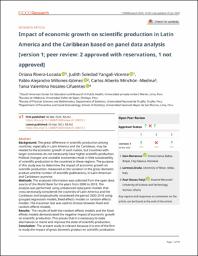| dc.contributor.author | Rivera-Lozada, Oriana | |
| dc.contributor.author | Yangali-Vicente, Judith Soledad | |
| dc.contributor.author | Millones-Gòmez, Pablo Alejandro | |
| dc.contributor.author | Minchón -Medina, Carlos Alberto | |
| dc.contributor.author | Rosales-Cifuentes, Tania Valentina | |
| dc.date.accessioned | 2023-08-28T20:11:43Z | |
| dc.date.available | 2023-08-28T20:11:43Z | |
| dc.date.issued | 2023-02-06 | |
| dc.identifier.uri | https://hdl.handle.net/20.500.13053/9225 | |
| dc.description.abstract | “Background: The great difference in scientific production among
countries, especially in Latin America and the Caribbean, may be
related to the economic growth of each nation, but countries with
larger economies do not necessarily have higher scientific production.
Political changes and unstable economies result in little sustainability
of scientific production in the countries in these regions. The purpose
of this study was to determine the impact of economic growth on
scientific production, measured as the variation in the gross domestic
product and the number of scientific publications, in Latin American
and Caribbean countries.
Methods: The analyzed information was collected from the open data
source of the World Bank for the years from 2000 to 2018. The
analysis was performed using unbalanced data panel models that
cross-sectionally considered the countries of Latin America and the
Caribbean and longitudinally considered the period 2000-2018 using
grouped regression models, fixed effects models or random effects
models. The Hausman test was used to choose between fixed and
random effects models.
Results: The results of both the random effects models and the fixed
effects models demonstrated the negative impact of economic growth
on scientific production. This proves that it is necessary to state
alternatives to mend and improve the state of scientific production.
Conclusion: The present study is relevant because it is one of the first
to study the impact of gross domestic product on scientific production in Latin American and Caribbean countries from a longitudinal
perspective that also allows evaluating the dynamics of both variables.“ | es_PE |
| dc.format | application/pdf | es_PE |
| dc.language.iso | eng | es_PE |
| dc.publisher | F1000 Research Ltd | es_PE |
| dc.rights | info:eu-repo/semantics/openAccess | es_PE |
| dc.rights.uri | https://creativecommons.org/licenses/by/4.0/ | es_PE |
| dc.subject | growth, Scientific, production, data, analys | es_PE |
| dc.title | “Impact of economic growth on scientific production in Latin America and the Caribbean based on panel data analysis [version 1; peer review: 2 approved with reservations, 1 not approved] “ | es_PE |
| dc.type | info:eu-repo/semantics/article | es_PE |
| dc.identifier.doi | 10.12688/f1000research.128075.1 | |
| dc.type.version | info:eu-repo/semantics/publishedVersion | es_PE |
| dc.publisher.country | UK | es_PE |
| dc.subject.ocde | 3.03.00 -- Ciencias de la salud | es_PE |


